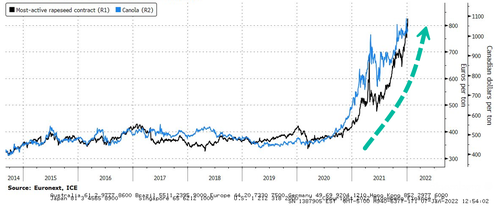Edible Oil Prices Hit Record High As Food Inflation Worries Persist
Edible oil prices continue to surge to record highs amid adverse weather conditions for the world’s oilseed growers, adding to food-inflation worries that will persist through 2022.
Rapeseed and canola prices hit another record high on Friday after last year’s harvests in North America and Europe were hit with severe drought and reduced plantings, slashing global rapeseed stockpiles to a four-year low.
New concerns are developing in South America as a La Nina weather pattern has produced hot and dry weather in top growing regions and massive floods hitting palm oil farms in Malaysia.
Then there’s the rally in crude prices and the push towards a greener future, leading to increased demand for vegetable oils to produce biofuels.
Arthur Portier, an analyst at Paris-based farm adviser Agritel, told Bloomberg, “the situation is really tight, and the buyers are still there.”
Paris rapeseed futures surged nearly 6% Friday to a new record high and was the largest intraday gain since 2009. North American canola rose as much as 1.5%.
Edible oils are a vital ingredient for many consumer packaged goods. Rising prices will only make food more expensive.
China and India are the biggest importers of edible oils. Emerging market households will feel the most pain as food prices continue to rise because they dedicate larger amounts of income to food purchases than developed world households.
With pressures from high demand and tight supplies, edible oil prices are expected to remain high this year. Also, global food prices as a whole are at decade-high levels.
